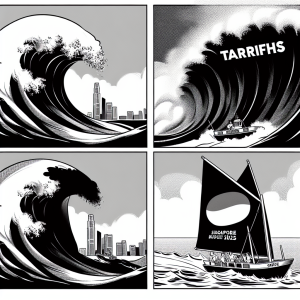Economists have projected Singapore’s economic growth for 2025 at 2.6%, according to a recent survey conducted by the central bank. This forecast reflects a cautious optimism amid a complex global economic landscape, characterized by both opportunities and challenges. As Singapore navigates these dynamics, its role as a key financial hub continues to be pivotal.
The projected growth rate aligns with broader trends observed globally. The International Monetary Fund (IMF) anticipates global GDP growth of approximately 3.1% in 2024 and 3.2% in 2025. This indicates a steady but modest recovery, particularly in advanced economies, while emerging markets may experience a more subdued performance. The gradual decline in global inflation, expected to drop to 5.8% in 2024 and 4.4% in 2025, is likely to be driven by the easing of supply-side constraints and the implementation of restrictive monetary policies.
Singapore’s economy, heavily reliant on its financial sector, is well-positioned to leverage these global trends. The city-state has established itself as a leading player in the foreign exchange and derivatives markets, as highlighted by the Triennial Central Bank Survey coordinated by the Bank for International Settlements (BIS). This survey underscores Singapore’s significance in the global financial ecosystem, particularly in foreign exchange spot markets and over-the-counter (OTC) derivatives. The upcoming survey in April 2025 will further illuminate Singapore’s contributions to financial data collection and analysis, emphasizing its strategic importance.
However, the road ahead is not without its hurdles. The IMF warns that while the global economy has shown resilience, risks are tilted towards the downside. Singapore must remain vigilant against potential disruptions stemming from renewed inflationary pressures and geopolitical tensions. As a major financial center, maintaining stability and adaptability will be crucial for Singapore’s economic health.
Additionally, the Singaporean government faces the challenge of balancing fiscal policies to sustain growth while managing inflation. The need for careful policy measures becomes increasingly apparent as the global economic environment shifts. This balancing act will be essential not only for fostering economic growth but also for rebuilding fiscal buffers that may have been strained during recent turbulent times.
In conclusion, Singapore’s projected growth of 2.6% for 2025 reflects a cautious but hopeful outlook amid a recovering global economy. As the city-state continues to adapt to both international economic trends and local challenges, its strategic position in global finance will be vital. Policymakers will need to navigate these complexities with precision to ensure that Singapore remains resilient and competitive in the years to come.





